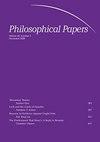Public Goods as Obligatory Bridges between the Public and the Private
IF 1.3
3区 哲学
0 PHILOSOPHY
引用次数: 0
Abstract
Abstract In the context of economics, the distinction between ‘the public’ and ‘the private’ has been paralleled with the distinction of ‘public policy’ on the one hand and the ‘private market’ on the other hand. Even though both spheres intermingle at some point, the first is the domain of government, the second is the domain of market laws. This contribution argues that public goods do not only undermine that distinction, but they also support an alternative interpretation of the private-public line. A thorough discussion of public goods redefines the relationship of public and private and portrays public goods as bridges between both spheres. The contribution starts with the classical definition of public goods as items that are non-excludable and non-rival with respect to potential profiteers. The paper then shifts the focus to the normative side of public goods. Precisely because of their characteristics as non-exclusive goods, these items are able to fulfil promises of the constitutional state. They enhance social inclusion, they serve the public by generating spaces of civilized interaction, and they even enhance the sense of shared citizenship. A focus on what has been termed ‘central public goods’ reveals that public goods serve important claims of social justice. After having explained why public goods should also be regarded as an important ingredient in the economic performance of the nation state, three bridging functions of public goods are apparent.公共产品是连接公共与私人的桥梁
摘要在经济学的背景下,“公共”和“私人”之间的区别一方面与“公共政策”和“私营市场”的区别平行。尽管这两个领域在某个时候交织在一起,但第一个领域是政府领域,第二个领域是市场法领域。这一贡献认为,公共产品不仅破坏了这种区别,而且还支持对私人-公共路线的另一种解释。对公共产品的深入讨论重新定义了公共和私人的关系,并将公共产品描绘成两个领域之间的桥梁。这一贡献始于对公共产品的经典定义,即不可排除和不可与潜在获利者竞争的物品。然后,本文将重点转移到公共产品的规范方面。正是因为它们具有非排他性商品的特性,这些物品才能够履行宪法国家的承诺。它们增强了社会包容,通过创造文明互动的空间为公众服务,甚至增强了共同的公民意识。对所谓“中心公共产品”的关注表明,公共产品服务于社会正义的重要诉求。在解释了为什么公共产品也应该被视为民族国家经济绩效的重要组成部分之后,公共产品的三个桥接功能是显而易见的。
本文章由计算机程序翻译,如有差异,请以英文原文为准。
求助全文
约1分钟内获得全文
求助全文
来源期刊

Philosophical Papers
PHILOSOPHY-
CiteScore
2.10
自引率
0.00%
发文量
18
期刊介绍:
Philosophical Papers is an international, generalist journal of philosophy edited in South Africa Original Articles: Articles appearing in regular issues are original, high-quality, and stand-alone, and are written for the general professional philosopher. Submissions are welcome in any area of philosophy and undergo a process of peer review based on initial editor screening and refereeing by (usually) two referees. Special Issues: Topic-based special issues are comprised of both invited and submitted papers selected by guest editors. Recent special issues have included ''Philosophy''s Therapeutic Potential'' (2014, editor Dylan Futter); ''Aging and the Elderly'' (2012, editors Tom Martin and Samantha Vice); ''The Problem of the Criterion'' (2011, editor Mark Nelson); ''Retributive Emotions'' (2010, editor Lucy Allais); ‘Rape and its Meaning/s’ (2009, editor Louise du Toit). Calls for papers for upcoming special issues can be found here. Ideas for future special issues are welcome.
 求助内容:
求助内容: 应助结果提醒方式:
应助结果提醒方式:


